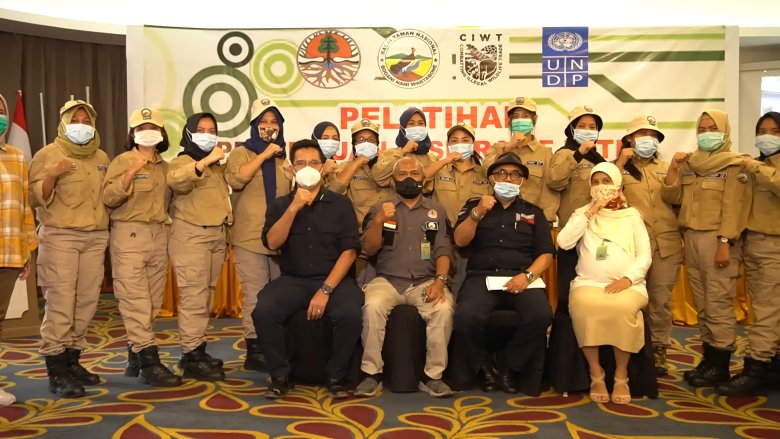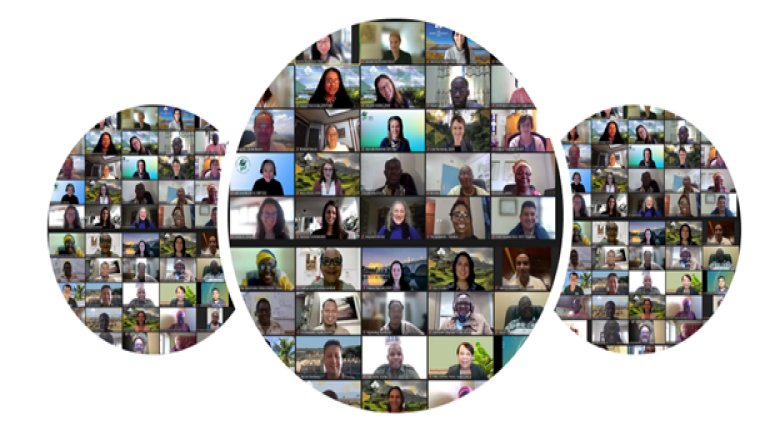In Bogani Nani Wartabone National Park in Indonesia, a 15-member women ranger group are on a mission to combat wildlife poaching. A few years ago, only men patrolled this area and now, women rangers are diligently patrolling long distances, confiscating illegal snares, and facilitating information flows between communities and the park management.

Picture 1. Perempuan Inspiratif Mitra Polisi Kebutaanan group photo. Photo credit: Combatting Illegal Wildlife Trade (CIWT) Project Indonesia.
The training [of female rangers] serves as a model that will hopefully reduce illegal activities in the conservation area and protect wildlife, as well as inspire new livelihood alternatives,
The journey of women rangers, however, does not only begin in the rainforests of Indonesia, it begins in the Zambezi Valley in Africa. In 2018, Sustyo Iriyono and Achmad Pribadi, Project Manager of the Combatting Illegal Wildlife Trade Indonesia project joined representatives from 20 other countries at the Global Wildlife Program (GWP) conference hosted in partnership with the Governments of Zambia and Zimbabwe. As part of the conference, they saw firsthand a women-led ranger force within the Zimbabwe Parks and Wildlife Management Authority. They heard about the benefits observed in patrolling and community policing when women rangers were involved because of the trust they had built within the community. Inspired, they took these lessons and established the first women-led ranger group back in their home country of Indonesia.
Habitat loss, fragmentation and illegal wildlife trade threaten the world’s endangered species. Reducing these threats requires people to learn from one another, across borders and sectors, and scale up solutions quickly. The GWP, funded by the Global Environment Facility and led by the World Bank, provides a knowledge platform for projects across 32 countries in Asia, Africa, and Latin America to do exactly that.
Since its inception in 2015, the GWP has brought together hundreds of practitioners in the public, non-governmental and private sector to exchange lessons and build the knowledge base on what works and what does not in wildlife conservation. GWP’s in-person conferences were highly anticipated as they provided an opportunity for making new connections and facilitated interpersonal exchanges among enthusiastic people from the field and local government offices. These informal conversations were a subtle yet effective way for the program to enable project teams to share ideas that challenge the status quo.
Rebuilding the conservation community virtually
The COVID-19 pandemic brought a sudden stop to this in-person exchange. Even though the GWP hosted many virtual webinars prior to the pandemic, the feeling of a tight knit community developed through in-person workshops and study tours. Building that same level of trust and engagement and encouraging friendly peer-to-peer exchange is much harder to do virtually. To address this, the GWP has tried and tested different ways to host virtual events and invested in multiple resources and collaboration tools.
At a recent virtual conference, the team organized a ‘knowledge market’ where GWP project teams could share successes and receive ideas. The simulation of a ‘market’ of give and take created a bustling and interactive vibe for teams to move in and out of breakout rooms. Teams had 90 seconds to pitch their knowledge prior to teams deciding which breakouts to join for further discussion. In a span of 2.5 hours, participants were able to offer ideas, share their technical needs, hear from projects facing similar challenges, and find solutions that could be replicated around the world.
Achmad Pribadi shared Indonesia’s experience of establishing a female ranger force, disseminating further the initial insights from Zimbabwe, with multiple project teams interested to learn more. Responding to Mozambique’s request for ideas, the Panama team offered tactics on building strategic partnerships. Many projects raised human-wildlife conflict as an increasing challenge and the South Africa team shared a new framework that they had recently established to mitigate conflict as a way to kickstart discussions. The Bhutan team presented their high value-low impact tourism journey having celebrated 40 years since officially opening to tourists and the Vietnam team, who are working on a sustainable tourism model, are now following up to learn more.
The experience built by the GWP hosting a range of in-person and virtual events has taught the team important lessons on building an effective atmosphere for peer-to-peer knowledge exchange. The ‘knowledge market’ concept was successful because it gave project teams ownership of the agenda, who prepared what they thought would be useful to share and asked for help on topics they needed to know. In parallel to the live sessions, an online conference platform was created. Setting up such a platform takes time and resources, but it allowed for participants to engage across multiple regions, continue conversations that began during conference sessions, and catch up on sessions that they missed. These two elements combined kept the momentum for the virtual conference moving across time zones. Over the years, the GWP team has learned to be open to trialing a range of online collaboration tools and technology that encourage active participation, acknowledging that people engage in different ways and accepting that not all approaches will prove effective.
Moving forward, the GWP will continue to use a range of formats under its global knowledge platform to facilitate knowledge exchange between GWP countries, such as that experienced by Indonesia, and support countries to transform this knowledge gained into action.

